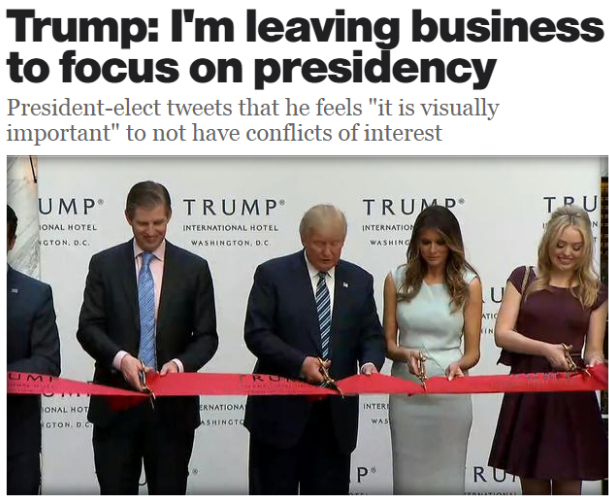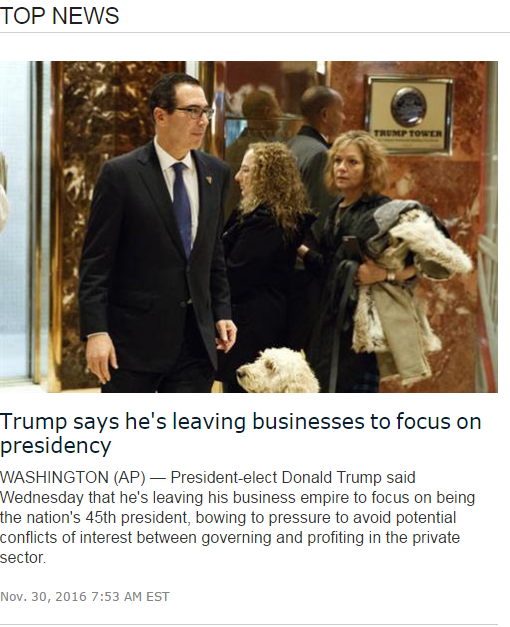
The Fourth Estate is an institution whose power and influence, while not officially recognized, provide a critical role in the checks and balances of political power. With Washington, D.C., entirely under Republican control, the media stands as the best available check against a White House that has signaled its resolve to gaslight its way through the next four years. But if political journalists’ post-election inertia is a harbinger of what role the press will play during a Trump administration, then the Fourth Estate is seemingly shaping up to roll over for the Trump White House.
In the weeks since Election Day, political journalism has largely fallen short both in style and substance. Journalists watching from the sidelines have been reduced to parroting Trump’s publicly available tweets -- allowing him to drive the news cycle -- and have bungled one of the most important roles the press plays during a transition period: the vetting of President-elect Donald Trump’s cabinet nominations and appointments.
Possibly the most glaring example of the press’s passive Trump coverage has been its coverage of Trump’s tweets. The new era of political journalism is seemingly being played out in the Twittersphere. Faced with a president-elect who is adept at using his Twitter feed to drive news coverage and who has refused to hold a post-election press conference and repeatedly ditched his traveling press pool, reporters have been suckered into relying on his vague, false, or dangerous tweets, frequently reporting his 140-character riffs without context or pushback. The political press is trading in its historical role as antagonistic investigators for the retweet button, letting Trump himself dictate what news is covered (and what isn’t) and how, without any follow-up questions. Trump has essentially reduced political reporters on Twitter to play-by-play commentators who narrate his every tweet.
When Trump falsely tweeted that “he won the popular vote over Clinton ‘if you deduct the millions of people who voted illegally,'" reporters “raced to their computers to file stories on Trump's latest outlandish claim, and many of the headlines and tweets that resulted neglected to make clear that he was peddling an erroneous conspiracy theory,” CNN reported.
When Trump vaguely tweeted that he would be leaving his businesses to avoid conflicts of interest, but offered no details of the arrangements, media headlines simply echoed Trump’s tweets, allowing him to drive news coverage with little pushback and no immediate follow-up. Trump ultimately canceled the press conference where he said he would announce these details -- but got the positive news cycle nonetheless. And in fact, American journalists have had to rely on foreign outlets for many of the stories that have emerged since the election about Trump potentially using his new role to further his business interests.
Likewise, precisely because Trump has starved out the press, his false or misleading tweets about saving jobs at the Indiana-based Carrier facility, keeping a Ford plant from moving to Mexico, threatening Boeing for its contract to update Air Force One, and taking credit for a $2 billion investment from SoftBank have been mindlessly amplified by the press, driving uncritical news coverage on Trump’s terms.
So far, media outlets have lazily elevated Trump’s Twitter claims with minimal pushback, and often reporters who fact-check a false Trump tweet do so hours, if not days, after Trump’s lie has already spread. Journalists retreating to Twitter for political journalism owe the public aggressive fact-checking not only in accompanying tweets, but also in the print and on-air reports that follow. Anything less, as has happened thus far, amounts to the media failing to do their job.
Reporting on Trump’s cabinet picks and other top-level appointees has not fared any better. A pattern has emerged in which Trump fills his cabinet with appointees whose personal and professional ideologies are largely antithetical to the agency they could soon be running -- a climate-denier at the Environmental Protection Agency, an anti-worker CEO heading the Labor Department, an Energy Department secretary who has previously suggested shutting down that department, a Putin pal at the helm of the State Department. Tough public vetting is perhaps the most important job the press has during a presidential transition, and yet journalists have stumbled when reporting on Trump’s troubling picks.
After Trump announced ExxonMobil CEO Rex Tillerson as his pick for secretary of state, morning news shows and newspapers noted that prominent figures including James Baker III, Robert M. Gates, and Condoleezza Rice had expressed support for Tillerson, with some mentioning that such support adds credibility to the pick. But those outlets failed to disclose that all three figures have considerable financial ties through their businesses to Tillerson, ExxonMobil, and the oil company’s Russian business ventures.

Likewise, several media outlets reporting on Trump’s selection of Tillerson have uncritically described Tillerson as accepting of climate change and supportive of a carbon tax. But these reports ignored scientifically inaccurate claims Tillerson has made about climate change, Exxon’s continued financial support of groups that deny climate science, inconsistencies by both Tillerson and Exxon on whether they truly support a carbon tax, and fierce opposition to Tillerson’s nomination from leading environmental groups -- not to mention the fact that Exxon is under investigation in several states for possibly violating state laws by deceiving shareholders and the public about climate change.
The media’s lackluster vetting efforts didn’t stop with Tillerson. CNN’s Alisyn Camerota whitewashed Trump’s choice for EPA administrator, Oklahoma Attorney General Scott Pruitt, by falsely claiming he “hasn’t denied global warming.” And some of the nation’s most prominent newspapers glossed over the discredited economic arguments peddled by Andy Puzder, Trump’s Labor Department pick, to justify opposition to raising the minimum wage, expanding overtime protections, and extending the scope of the Affordable Care Act.
The public deserves a tough and thorough vetting of Trump’s cabinet picks, especially given that the Republican-held Senate will presumably confirm most, if not all, of his picks with minimal scrutiny. But if the media is idle during this critical time, the question becomes: At what point will they come off the sidelines?
The media establishment is perhaps one of the last standing checks on the incoming Trump administration, and that role should be taken seriously. After all, if history is any lesson, an indolent press corps that allows a White House to run roughshod over reporters presents a very real danger to the American public at large.
As detailed by Media Matters’ Eric Boehlert in Lapdogs: How the Press Rolled Over for Bush, “the mainstream media completely lost their bearings during the Bush years and abdicated their Fourth Estate responsibility to report without fear or favor and to ask uncomfortable questions to people in power." Motivated by promises of access and by fear of being painted as “liberal,” political journalists, argued Boehlert, rolled over for the Bush White House time and again, helping to spin, justify, and normalize the administration’s actions regarding the run-up to the Iraq War, Hurricane Katrina, the “Swift Boat” campaign against John Kerry, and Bush’s military record.
Working for CNN at the time, now-Fox News host Howard Kurtz wrote in March 2013 that “the media's greatest failure in modern times” was that they “aided and abetted the Bush administration's march to war on what turned out to be faulty premises. All too often, skepticism was checked at the door, and the shaky claims of top officials and unnamed sources were trumpeted as fact.”
The parallels between the Bush White House’ treatment of the press and the signals of how Trump will (continue to) treat the media are striking. In a PBS interview, New Yorker columnist Ken Auletta noted that “the Bush administration [did] not accept that the press has a legitimate public interest role." He said administration officials wanted “to figure out a way to deliver their message” without engaging the press and they worked to justify “having so few press conferences.” He added that because Bush was “angry at the press,” the White House decided “to aggressively go after reporters.”
Accordingly, Auletta concedes, “the press went through a period of time where their coverage was too soft on Bush and [had] not enough skepticism.”
Trump seems similarly poised to continue icing out the press, in turn creating dangerous barriers to solid, aggressive reporting and, alternatively, incentives for favorable, pulled-punches coverage. He has yet to hold a post-election press conference, has spent the last month attacking the media, and is toying with the idea of eliminating White House press briefings. These assaults on the media, combined with an ongoing noneffort by the media to cover Trump vigorously, portend great trouble for the media's ability to serve as an institutional check on a Trump White House.


